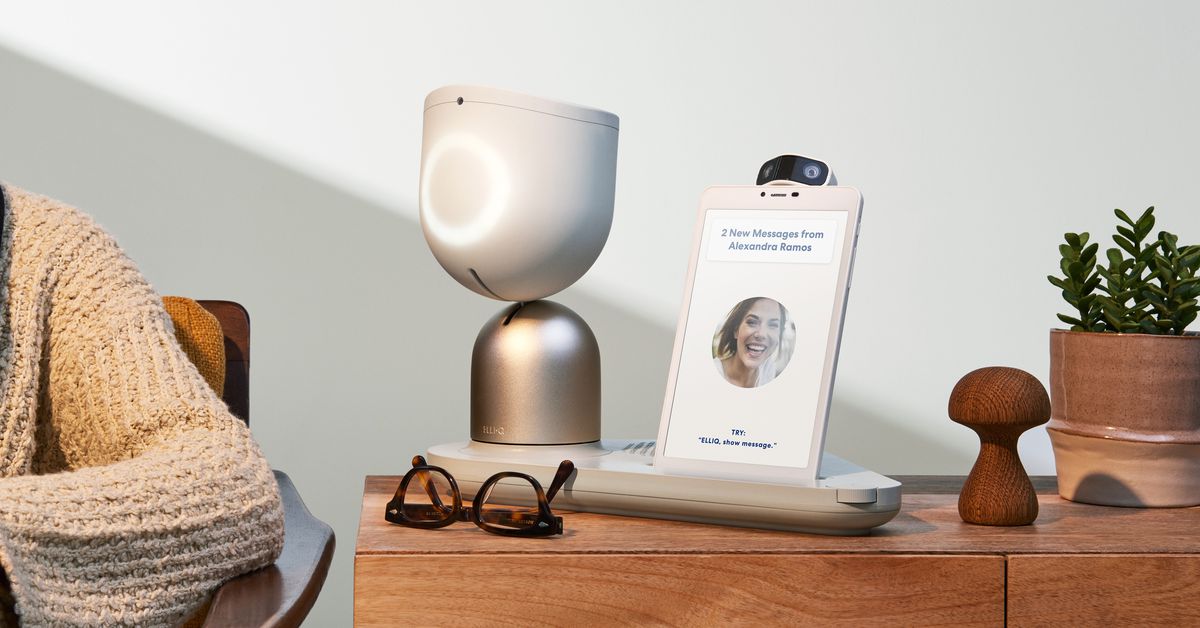NY State is giving out hundreds of robots as companions for the elderly
The state of New York will distribute robot companions to the homes of more than 800 older adults. The robots are not able to help with physical tasks, but function as more proactive versions of digital assistants like Siri or Alexa — engaging users in small talk, helping contact love ones, and keeping track of health goals like exercise and medication.
The scheme is being organized by the New York State Office for the Aging (NYSOFA), and is intended to help address the growing problem of social isolation among the elderly. An estimated 14 million Americans over the age of 65 currently live alone, and this figure is projected to increase over the next decade as the boomer generation ages. Studies have suggested that long-term loneliness is as damaging to an individual’s health as smoking.
NYSOFA director Greg Olsen says the robots — named ElliQ and built by Israeli firm Intuition Robotics — could help tackle this growing health problem by encouraging independence among older adults living alone and providing companionship.
“Many features attracted us to ElliQ — that it is a proactive tool, remembers the interactions with the individual, focuses on health and wellness, stress reduction, sleep, hydration, etc,” Olsen told The Verge. “It focuses on what matters to individuals: memories, life validation, interactions with friends and families and promotes overall good health and well being.”
ElliQ consists of two parts attached to a single base. The first part is a lamp-like “face” with microphone and speakers, that lights up and swivels to face people it’s talking to. The second is a touchscreen tablet, used to display pictures, additional information, and conduct video calls. The unit has been deliberately design to appear more robotic than humanoid, in order to better focus attention on its conversational abilities.
Intuition Robotics’ claim is that ElliQ can project empathy and form bonds with users. The robot is supposed to remember key details about a user’s life, and shape its character to their own. It will crack more jokes if the user tends to laugh a lot, for example. Media reports suggest the robot can certainly endear itself to people (ElliQ has been in development for many years with Intuition Robotics conducting dozens of home trials to hone its functionality) but the real test will be widespread deployment.
Olsen says that NYSOFA case managers will identify individuals who might benefit from ElliQ based on a few criteria. “ElliQ is designed for people aged 75 and older, who have access to Wi-Fi, and are comfortable with tech equipment and who are isolated or lonely,” he tells The Verge. “Once individuals are identified as being in the target group, Intuition Robotics will work to provide installation and training.”
NYSOFA has bought some 800 ElliQ units from Intuition Robotics for an unknown price. The usual cost to hire the robot is a $250 upfront fee and then a $30 monthly service charge. NYSOFA says by buying the robots outright it will be able to relocate them more easily.
Deploying robots for elderly care is often controversial. Advocates say robots are a necessary tool, especially when humans aren’t available. Critics warn machines have the potential to dehumanize their users, and their deployment reflects the low value society places on older adults. Scientific studies suggest social robots do “appear to have the potential to improve the well-being of older adults,” but researchers say it’s hard to draw conclusions without wider trials. In New York state, a new experiment is just beginning.
For all the latest Technology News Click Here

